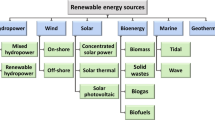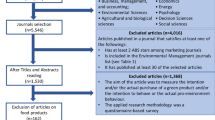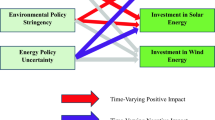Abstract
There is evidence in the literature that there exist gender-related differences in household energy choices. However, most of these studies have assumed the homogenous slope hypothesis a priori, which could affect the results if a formal test rejects the homogenous slope hypothesis. The Exogenous Switching Treatment Effect (ESTER) is used to ascertain the gender effects in household energy choice in Ghana. In comparison with the pooled regression method, ESTER relaxes the assumption of the same effect of covariates on male-headed households (MHHs) and female-headed households (FHHs). The results indicate that if FHHs characteristics were similar to those of MHHs, their probability of choosing cleaner energy would be higher. Our results suggest that supporting the heads in FHHs to have access to more economic opportunities as males tend to will potentially lead to positive effects on their probability of choosing clean energy. Our results give support to policies that strongly favor female education without disadvantaging male education.

Source: World development Indicators, 2020

Source: World development Indicators, 2020
Similar content being viewed by others
Notes
Data on forest statistics available at: https://statsghana.gov.gh/nationalaccount_macros.php?Stats=MjM3NTIyNzgzMy44ODU=/webstats/985rp49861.
References
Abebaw, D. (2007). Household determinants of fuelwood choice in urban Ethiopia: A case study of Jimma town. Journal of Developing Areas, 4(1), 117–126.
Acharya, B., & Marhold, K. (2019). Determinants of household energy use and fuel switching behavior in Nepal. Energy, 169, 1132–1138.
Adams, S., Klobodu, E. K. M., & Apio, A. (2018). Renewable and non-renewable energy, regime type and economic growth. Renewable Energy, 125, 755–767.
Adjei-Mantey, K., & Takeuchi, K. (2019). Does free distribution of equipment work? Measuring the impacts of Ghana’s Rural LPG Promotion Program. Paper presented at the 2019 annual meeting of the Society for Environmental Economics and Policy Studies. September 2019, Japan.
Adjei-Mantey, K., & Takeuchi, K. (2021). The effect of in utero exposure to household air pollution on child health: evidence from Ghana. Health Policy OPEN, 2, 100029.
Adua, L. (2010). To cool a sweltering Earth: Does energy efficiency improvement offset the climate impacts of lifestyle? Energy Policy, 38(10), 5719–5732.
Adua, L. (2020). Reviewing the complexity of energy behavior: technologies, analytical traditions, and household energy consumption data in the United States. Energy Research & Social Science, 59, 101289.
Adua, L., & Sharp, J. S. (2011). Explaining residential energy consumption: A focus on location and race differences in natural gas use. Journal of Rural Social Sciences, 26(1), 6.
Adusah-Poku, F., Adjei-Mantey, K., & Kwakwa, P. A. (2021). Are energy poor households also poor? Evidence from Ghana. Poverty and Public Policy, 13(1), 32–58.
Adusah-Poku, F., & Takeuchi, K. (2019). Household energy expenditure in Ghana: A double-hurdle model approach. World Development, 117, 266–277.
Africa Energy Outlook. (2019). Integration for Africa’s economic prosperity. International Energy Agency IEA.
Ahmed, A., & Gasparatos, A. (2020). Multi-dimensional energy poverty patterns around industrial crop projects in Ghana: Enhancing the energy poverty alleviation potential of rural development strategies. Energy Policy, 137, 111123.
Ali, A., Mottaleb, K. A., & Aryal, J. P. (2019). Wealth, education and cooking-fuel choices among rural households in Pakistan. Energy Strategy Reviews, 24, 236–243.
An, L., Lupi, F., Liu, J., Linderman, M. A., & Huang, J. (2002). Modeling the choice to switch from fuelwood to electricity: Implications for giant panda habitat conservation. Ecological Economics, 42(3), 445–457.
Armah, F. A., Ekumah, B., Yawson, D. O., Odoi, J. O., Afitiri, A. R., & Nyieku, F. E. (2019). Predictive probabilities of access to clean cooking: Evidence from the demographic and health surveys in 31 countries in sub-Saharan Africa. Environmental Justice, 12(3), 118–131.
Armah, F. A., Odoi, J. O., & Luginaah, I. (2015). Indoor air pollution and health in Ghana: Self-reported exposure to unprocessed solid fuel smoke. EcoHealth, 12(2), 227–243.
Aryal, J. P., Mottaleb, K. A., & Ali, A. (2019). Gender and household energy choice using exogenous switching treatment regression: Evidence from Bhutan. Environmental Development, 30, 61–75.
Asante, K. P., Afari-Asiedu, S., Abdulai, M. A., Dalaba, M. A., Carrión, D., Dickinson, K. L., Abeka, A. N., Sarpong, K., & Jack, D. W. (2018). Ghana’s rural liquefied petroleum gas program scale up: A case study. Energy for Sustainable Development, 46, 94–102.
Bednar, D. J., Reames, T. G., & Keoleian, G. A. (2017). The intersection of energy and justice: Modeling the spatial, racial/ethnic and socioeconomic patterns of urban residential heating consumption and efficiency in Detroit, Michigan. Energy and Buildings, 143, 25–34.
Bisu, D. Y., Kuhe, A., & Iortyer, H. A. (2016). Urban household cooking energy choice: An example of Bauchi metropolis, Nigeria. Energy, Sustainability and Society, 6, 15.
Bloomberg Finance. (2020). Sub-Saharan Africa market outlook 2020. Bloomberg Finance L.P. Retrieved September 15, 2020, from https://global-climatescope.org/assets/data/docs/updates/2020-02-06-sub-saharan-africa-market-outlook-2020.pdf.
Casaló, L. V., & Escario, J. J. (2018). Heterogeneity in the association between environmental attitudes and pro-environmental behavior: A multilevel regression approach. Journal of Cleaner Production, 175, 155–163.
Cecelski, E. (2004). Re-thinking gender and energy: Old and new directions. ENERGIA/EASE discussion paper. ENERGIA.
Cherfas, J. (1991). Skeptics and visionaries examine energy saving. Science, 251(4990), 154–156.
Choumert-Nkolo, J., Motel, P. C., & Le Roux, L. (2019). Stacking up the ladder: A panel data analysis of Tanzanian household energy choices. World Development, 115, 222–235.
Danlami, A. H., & Islam, R. U. (2020). Explorative analysis of household energy consumption in Bauchi State, Nigeria. In M. J. Hermoso-Orzáez & A. Gago-Calderón (Eds.), Energy efficiency and sustainable lighting—a bet for the future. IntechOpen.
Dendup, N., & Arimura, T. H. (2019). Information leverage: The adoption of clean cooking in Bhutan. Energy Policy, 125, 181–195.
Doepke, M., & Tertilt, M. (2014). Does female empowerment promote economic development. The World Bank.
Etchie, A. T., Etchie, T. O., Elemile, O. O., Boladale, O., Oni, T., Akanno, I., Bankole, D. T., Ibitoye, O. O., Pillarisetti, A., Sivanesan, S., & Afolabi, T. Y. (2020). Burn to kill: Wood ash a silent killer in Africa. Science of the Total Environment, 748, 141316.
Fingleton-Smith, E. (2018). The lights are on but no (men) are home. The effect of traditional gender roles on perceptions of energy in Kenya. Energy Research & Social Science, 40, 211–219.
Global Environment Outlook. (2019). GEO-6: Healthy planet, healthy people. United Nations Environment Programme.
Global Environment Outlook. (2020). GEO matters: Healthy planet, healthy people. United Nations Environment Programme.
Goldemberg, J., Martinez-Gomez, J., Sagar, A., & Smith, K. R. (2018). Household air pollution, health, and climate change: Cleaning the air. Environment Research Letters, 13(3), 030201.
Gottfried, H. (2013). Gender, work, and economy: Unpacking the global economy. Polity Press.
Gould, C. F., & Urpelainen, J. (2020). The gendered nature of liquefied petroleum gas stove adoption and use in rural India. Journal of Development Studies, 56(7), 1309–1329.
International Energy Agency (IEA). (2016). World energy outlook 2016: Executive summary. IEA.
International Energy Agency (IEA). (2017). Energy access outlook 2017: From poverty to prosperity. IEA.
IRENA. (2018). Solid biomass supply for heat and power: Technology brief. International Renewable Energy Agency.
Karimu, A. (2015). Cooking fuel preferences among Ghanaian households: An empirical analysis. Energy for Sustainable Development, 27, 10–17.
Karimu, A., Mensah, J. T., & Adu, G. (2016). Who adopts LPG as main cooking fuel and why? Empirical evidence on Ghana based on national survey. World Development, 85, 43–57.
Kowsari, R., & Zerriffi, H. (2011). Three dimensional energy profile: A conceptual framework for assessing household energy use. Energy Policy, 39(12), 7505–7517.
Lewis, J. J., & Pattanayak, S. K. (2012). Who adopts improved fuels and cookstoves? A systematic review. Environmental Health Perspectives, 120(5), 637–645.
Li, J., Zhang, J., Zhang, D., & Ji, Q. (2019). Does gender inequality affect household green consumption behaviour in China? Energy Policy, 135, 111071.
Lutzenhiser, L. (1993). Social and behavioral aspects of energy use. Annual Review of Energy and the Environment, 18(1), 247–289.
Ma, W., Zhou, X., & Renwick, A. (2019). Impact of off-farm income on household energy expenditures in China: Implications for rural energy transition. Energy Policy, 127, 248–258.
Malla, S., & Timilsina, G. R. (2014). Household cooking fuel choice and adoption of improved cookstoves in developing countries: A review. World Bank Policy Research Working Paper 6903.
Mensah, J. T., & Adu, G. (2015). An empirical analysis of household energy choice in Ghana. Renewable and Sustainable Energy Reviews, 51, 1402–1411.
Mottaleb, K. A., & Ali, A. (2017). An exploration into the household energy choice and expenditure in Bangladesh. Energy, 135, 767–776.
Muller, C., & Yan, H. (2018). Household fuel use in developing countries: Review of theory and evidence. Energy Economics, 70, 429–439.
Nnaji, C. E., Ukwueze, E. R., & Chukwu, J. O. (2012). Determinants of household energy choices for cooking in rural areas: Evidence from Enugu State, Nigeria. Continental Journal of Social Sciences, 5(2), 1–11.
Nwaka, I. D., Uma, K. E., & Ike, G. N. (2020). Determinants of household fuel choices among Nigerian family heads: Are there gender-differentiated impacts? Environmental Science and Pollution Research, 27, 1–14.
Ouedraogo, B. (2006). Household energy preferences for cooking in urban Ouagadougou, Burkina Faso. Energy Policy, 34(18), 3787–3795.
Pearse, R., & Connell, R. (2016). Gender norms and the economy: Insights from social research. Feminist Economics, 22(1), 30–53.
Piabuo, S. M., & Puatwoe, J. T. (2020). Public health effects of wood fuel in Africa: Bioenergy from tree commodities as a sustainable remedy. In E. E. Anugwom & N. Awofeso (Eds.), Public health in developing countries-challenges and opportunities. IntechOpen.
Rahut, D. B., Ali, A., Mottaleb, K. A., & Aryal, J. P. (2020). Understanding households’ choice of cooking fuels: Evidence from urban households in Pakistan. Asian Development Review, 37(1), 185–212.
Rahut, D. B., Behera, B., & Ali, A. (2017). Factors determining household use of clean and renewable energy sources for lighting in Sub-Saharan Africa. Renewable and Sustainable Energy Reviews, 72, 661–672.
Rahut, D. B., Das, S., De Groote, H., & Behera, B. (2014). Determinants of household energy use in Bhutan. Energy, 69, 661–672.
Sana, A., Kafando, B., Dramaix, M., Meda, N., & Bouland, C. (2020). Household energy choice for domestic cooking: Distribution and factors influencing cooking fuel preference in Ouagadougou. Environmental Science and Pollution Research, 27, 1–9.
Sarkodie, S. A., & Adams, S. (2020). Electricity access, human development index, governance and income inequality in Sub-Saharan Africa. Energy Reports, 6, 455–466.
Scheid, A., Hafner, J. M., Hoffmann, H., Kächele, H., Uckert, G., Sieber, S., & Rybak, C. (2019). Adapting to fuelwood scarcity: The farmers’ perspective. Frontiers in Sustainable Food Systems, 3, 28.
Sehjpal, R., Ramji, A., Soni, A., & Kumar, A. (2014). Going beyond incomes: Dimensions of cooking energy transitions in rural India. Energy, 68, 470–477.
Shahbaz, M., Zakaria, M., Shahzad, S. J. H., & Mahalik, M. K. (2018). The energy consumption and economic growth nexus in top ten energy-consuming countries: Fresh evidence from using the quantile-on-quantile approach. Energy Economics, 71, 282–301.
Shallo, L., Ayele, M., & Sime, G. (2020). Determinants of biogas technology adoption in southern Ethiopia. Energy, Sustainability and Society, 10(1), 1–13.
Shove, E., & Walker, G. (2014). What is energy for? Social practice and energy demand. Theory, Culture & Society, 31(5), 41–58.
Shrestha, B., Bajracharya, S. B., Keitsch, M. M., & Tiwari, S. R. (2020). Gender differences in household energy decision-making and impacts in energy saving to achieve sustainability: A case of Kathmandu. Sustainable Development, 28(5), 1049–1062.
Shrestha, B., Tiwari, S., & Bajracharya, S. (2021). Role of gender participation in urban household energy technology for sustainability: A case of Kathmandu. Discover Sustainability, 2(1), 1–18. https://doi.org/10.1007/s43621-021-00027-w
Soltani, M., Rahmani, O., Beiranvand Pour, A., Ghaderpour, Y., Ngah, I., & Misnan, S. H. (2019). Determinants of variation in household energy choice and consumption: Case from Mahabad City, Iran. Sustainability, 11(17), 4775.
Stern, P. C. (1986). Blind spots in policy analysis: What economics doesn’t say about energy use. Journal of Policy Analysis and Management, 5(2), 200–227.
Twumasi, M. A., Jiang, Y., Ameyaw, B., Danquah, F. O., & Acheampong, M. O. (2020). The impact of credit accessibility on rural households clean cooking energy consumption: The case of Ghana. Energy Reports, 6, 974–983.
UN. (2018). United Nations Women annual report. Empowering women and promoting gender equality. Berlin: UN.
UNEP. (2019). Review of Woodfuel biomass production and utilization in Africa: A desk study. United Nations Environment Programme.
Van der Kroon, B., Brouwer, R., & Van Beukering, P. J. (2013). The energy ladder: Theoretical myth or empirical truth? Results from a meta-analysis. Renewable and Sustainable Energy Reviews, 20, 504–513.
Ward-Batts, J. (2008). Out of the wallet and into the purse using micro data to test income pooling. Journal of Human Resources, 43(2), 325–351.
Wilson, C., & Dowlatabadi, H. (2007). Models of decision making and residential energy use. Annual Review of Environment and Resources, 32, 169–203.
World Bank. (2020). World development indicators. The World Bank Group. http://datatopics.worldbank.org/world-development-indicators/.
Yasmin, N., & Grundmann, P. (2020). Home-cooked energy transitions: Women empowerment and biogas-based cooking technology in Pakistan. Energy Policy, 137, 111074.
Zelezny, L. C., Chua, P. P., & Aldrich, C. (2000). New ways of thinking about environmentalism: Elaborating on gender differences in environmentalism. Journal of Social Issues, 56(3), 443–457.
Zou, B., & Luo, B. (2019). Rural household energy consumption characteristics and determinants in China. Energy, 182, 814–823.
Funding
The authors did not receive support from any organization for the submitted work.
Author information
Authors and Affiliations
Corresponding author
Additional information
Publisher's Note
Springer Nature remains neutral with regard to jurisdictional claims in published maps and institutional affiliations.
Rights and permissions
About this article
Cite this article
Adusah-Poku, F., Adams, S. & Adjei-Mantey, K. Does the gender of the household head affect household energy choice in Ghana? An empirical analysis. Environ Dev Sustain 25, 6049–6070 (2023). https://doi.org/10.1007/s10668-022-02293-8
Received:
Accepted:
Published:
Issue Date:
DOI: https://doi.org/10.1007/s10668-022-02293-8




